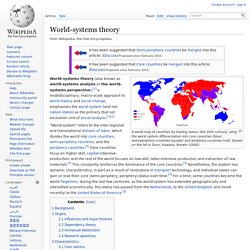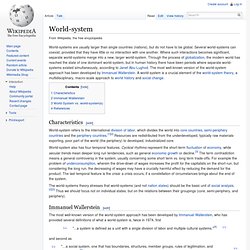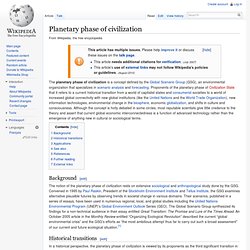

The 10 Biggest Problems In The World According To The EU. History of the International System - Download free content from Stanford. Politics and International Relations Podcasts - Download free content from Oxford University. International Politics - Download free content from Yale University. Global Geopolitics - Download free content from Stanford. Ethics, Law and Armed Conflict - Download free content from Oxford University. Human Rights - Audio - Download free content from CSIS Center for Strategic and International Studies. The State of the State - Download free content from Oxford University. Trade and Economics - Audio - Download free content from CSIS Center for Strategic and International Studies.
Globalization. Globalisation (or globalization) is the process of international integration arising from the interchange of world views, products, ideas, and other aspects of culture.[1][2] Advances in transportation and telecommunications infrastructure, including the rise of the telegraph and its posterity the Internet, are major factors in globalization, generating further interdependence of economic and cultural activities.[3] Though scholars place the origins of globalization in modern times, others trace its history long before the European age of discovery and voyages to the New World. Some even trace the origins to the third millennium BCE.[4][5] In the late 19th century and early 20th century, the connectedness of the world's economies and cultures grew very quickly. Overview[edit] Humans have interacted over long distances for thousands of years. Airline personnel from the "Jet set" age, circa 1960.
Etymology and usage[edit] Sociologists Martin Albrow and Elizabeth King define globalization as: World-systems theory. A world map of countries by trading status, late 20th century, using the world system differentiation into core countries (blue), semi-periphery countries (purple) and periphery countries (red).

Based on the list in Dunn, Kawana, Brewer (2000). World-systems theory (also known as world-systems analysis or the world-systems perspective),[1] a multidisciplinary, macro-scale approach to world history and social change, emphasizes the world-system (and not nation states) as the primary (but not exclusive) unit of social analysis.[1][2] Background[edit] Immanuel Wallerstein has developed the best-known version of world-systems analysis, beginning in the 1970s.[4][5] Wallerstein traces the rise of the capitalist world-economy from the "long" sixteenth century (c. 1450-1640). Many other scholars have contributed significant work in this "knowledge movement".[2] Origins[edit] Influences and major thinkers[edit] World-systems theory was aiming to replace modernization theory.
Dependency theory[edit] JOURNAL OF WORLD-SYSTEMS RESEARCH. WorldSystem.pdf (Objet application/pdf) World-system. World-systems are usually larger than single countries (nations), but do not have to be global.

Several world-systems can coexist, provided that they have little or no interaction with one another. Where such interactions becomes significant, separate world-systems merge into a new, larger world-system. Planetary phase of civilization. The planetary phase of civilization is a concept defined by the Global Scenario Group (GSG), an environmental organization that specializes in scenario analysis and forecasting.

Proponents of the planetary phase of Civilization State that it refers to a current historical transition from a world of capitalist states and consumerist societies to a world of increased global connectivity with new global institutions (like the United Nations and the World Trade Organization), new information technologies, environmental change in the biosphere, economic globalization, and shifts in culture and consciousness. Although the concept is hotly debated in some circles, most reputable scientists give little credence to the theory and assert that current global economic interconnectedness is a function of advanced technology rather than the emergence of anything new in cultural or sociological terms.
Background[edit] Historical transitions[edit] Applications[edit] UDHR Materials. What are Human Rights. Human rights are rights inherent to all human beings, whatever our nationality, place of residence, sex, national or ethnic origin, colour, religion, language, or any other status.

We are all equally entitled to our human rights without discrimination. These rights are all interrelated, interdependent and indivisible. Universal human rights are often expressed and guaranteed by law, in the forms of treaties, customary international law , general principles and other sources of international law. International human rights law lays down obligations of Governments to act in certain ways or to refrain from certain acts, in order to promote and protect human rights and fundamental freedoms of individuals or groups. Freedom Fighters & Human Rights. UN Organizations. Text: Conventions and Charters. War & Peace. Society & Modern Politics. Government Shutdown & Debt Ceiling 2013.